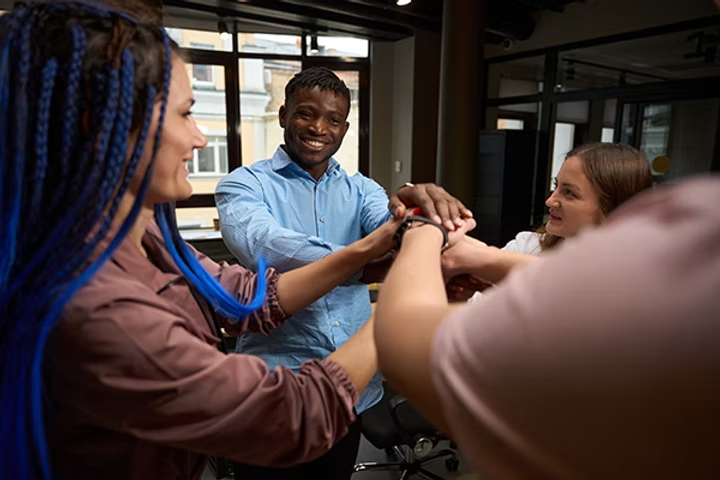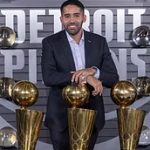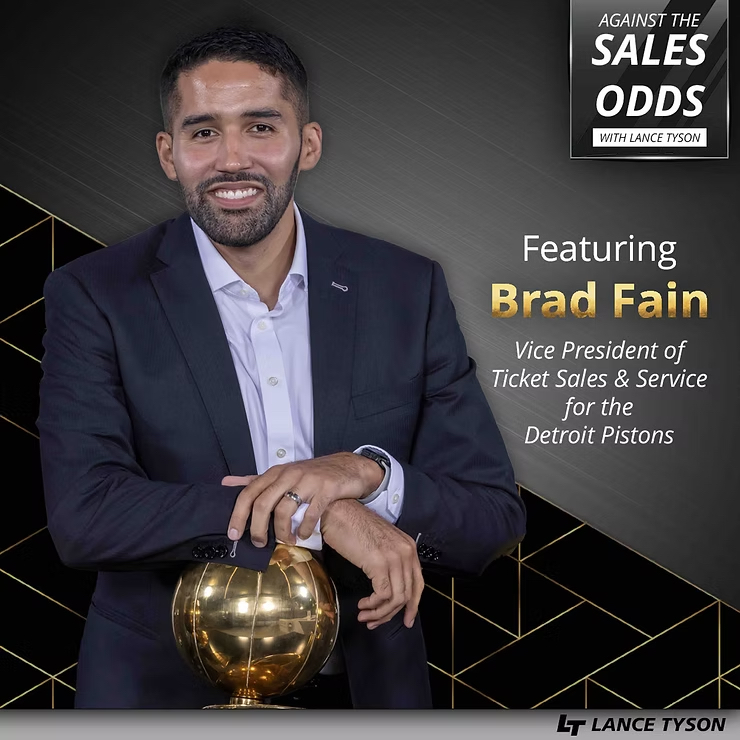Sharpen your sales sword and create a winning sales culture! In this captivating episode of Against The Sales Odds, Lance delves into a compelling dialogue with Brad Fain, the VP of Ticket Sales & Service at the Detroit Pistons. Brad unveils his extraordinary journey in the professional sports realm, shedding light on his strategic leadership ethos centered around understanding the ‘why.’ Far from content with merely honing his team’s skills, Brad leads by example, perpetually refining his expertise while fostering seamless communication and alignment among his peers. Whether navigating through triumphs or challenges, Brad remains an accessible leader, investing in his team’s growth and ensuring their voices are heard. Through his unconventional path and relentless pursuit of excellence, Brad epitomizes an opportunistic spirit that ignites inspiration and propels others to new heights.
—
Listen to the podcast here
Sharpening The Sales Sword: Fostering A Winning Sales Culture With Brad Fain Of Detroit Pistons
As A Leader How Do You Expect Results If You Do Not Have The Right Path?
I am excited about this episode because it’s somebody I’ve spent a lot of time with throughout his career, especially the last few years through coming out of COVID, we spent an amount of time. I like to welcome Brad Fain, who is the Vice President of Ticket Sales & Service for the Detroit Pistons. Brad, welcome to this episode. I’m glad you’re on.
I appreciate it. I’m happy to be on.
Brad, in our pre-game leading up to this, I talked to a lot of organizations that are selling an organization that’s strong where they won their championship or their crushing market share or something. As I work with Brad, if we’re measuring what he has to sell with wins and losses, I’m not being critical. They have to sell that brand to Detroit Pistons and it’s Detroit. It’s the Midwest. There’s a good NFL team up there. There’s a baseball team. There’s a hockey team. Market share is market share. Brad, help the audience understand what is your role at the Detroit Pistons in the NBA.
Leading Ticket Sales And Service
I appreciate that, Lance. My role with the Detroit Pistons is the Vice President of Ticket Sales & Service. I oversee all of ticketing on the Piston side and that includes group sales, season ticket services, premium member experience, premium sales, business development, and then our entry-level program, our ticket sales associates. Not only are we responsible for selling tickets for the Detroit Pistons, but it also includes our premium areas. It’s all things that are Pistons-related.
What’s that? Describe it to the readers. I was explaining to my banker the other day. He goes, “Lance, it’s your company that does a lot of stuff in sports and entertainment.” I said, “Yeah, it’s a part of our mix.” What are some things they sell? I said, “First of all, it’s how they sell. You go from a very consumer-based simplistic sale to somebody who might be a fan to something that you are asking for budget or B2B. Let’s start with leadership. What’s the leadership that reports to you and then the critical mass and those teams underneath that?
I can outline that for you. We have Amber, who’s our Senior Director, of Premium and Membership Development. The units that roll up to her include Premium Sales and Service and our Membership Experience team or our Service Team. We also have Clark who is our Senior Director of Group Sales. He oversees all of our group sales efforts. We have Nicole Medvitz who manages our business development team, and they’re predominantly selling to both B2B and B2C. Matt oversees our Ticket Sales Team, which is our entry-level program.
What’s your headcount because you got 5 or 6 teams there?
We have approximately 40 to 45 people on staff, the upper 30s in terms of sales reps, and then about 7 people leaders. We’re lean and mean.
Lean and mean but a lot of people reading are going, “That’s a pretty big sales team all in.” My question that themes this out a little bit is we’re going into a presidential cycle. We do a lot of business in Detroit. I can’t say that in Detroit the economy’s booming. There’s probably an argument that goes back and forth that it’s great, but it’s not great. It depends on where you stand. What’s the hardest thing right this second to keep your sales team motivated? What are you doing? What are your leaders doing? What are you focused on? What does the conversation look like?
I’d like to peel back a few layers of that. Addressing the presidential cycle and some of the economy, I think there are a lot of misconceptions when it comes to certain cities and Detroit certainly isn’t excluded from that.
There’s a moniker put on that a little bit of what Detroit is and isn’t, right?
Absolutely. I moved to Detroit from New York City and have a lot of connections. Family members asked me why. Once you experience Detroit, they have so much to offer and the city’s rebounding. In terms of city bonds, we were just upgraded from junk bonds to now we’re at least investible, which is great in terms of external investments that can be poured into the city.
Our office looks downtown and you see skyscrapers going up and that’s a big reason as to why there’s more money being poured into the city. It’s not just the motive industry, which is very important to the city, but Michigan is becoming a tech hub. Crypto is big and the cannabis industry has taken off. There is a significant financial impact occurring right now.
We even look at Detroit. You have invested just like your performance center in Detroit. You made a major investment in the city there. All the teams play downtown, which has not always been the case, right?
Correct, and it was a strategic move for us to move from Auburn Hills Downtown but to answer your question about what we’re doing to keep the team excited, I think the easiest objection and where the team gets a lot of pushback is as you mentioned on the outset is team performance. Also, just adopting more of a consultative sale to remind the team, “Let’s get back to the core basics and address in a consultative manner, but then also trying to be extremely positive.”
Are they following the right behavior of getting people out to games, hitting key touchpoints, and sticking to our process, or are we deviating and is that why results might not be coming? As a leadership team, we need to make sure that we’re doing the fun stuff. Keeping them engaged. Since the Olympics are occurring, one of the contests that we’re doing right now is Olympics-based. They’re all broken out into different countries.
We’ve got a nice internal competitive vibe going on right now with France, Jamaica, Sweden, Canada, Australia, Italy, Greece, and the United Kingdom. We’ll see how that wraps when we conclude early bird but we work in sports and entertainment and the thing that we should always keep in mind is we want to crush goals and do an outstanding job, but this is also a fun industry to work in.

Detroit Piston Sales: The thing that we should always keep in mind is we want to crush goals and do an
outstanding job, but this is also a fun industry to work in.
We work in sports and entertainment. That’s my tone at all. You know me pretty well. If you can’t sell wins or losses, then you have to sell giant human beings running around in shorts. What’s not fun about that? That would go for any sport at the end of the day because like in any business, not everybody’s a winner if you’re selling wins and losses. If your team wins all the time, that might be a little easier to sell. I think we need to go back to your core philosophy, which I’m so excited you are on because you have a certain belief system on how you manage talent and what you invest in.
I always go here. Everybody’s like, “How’s a guy like Brad?” By the way, a little background on Brad. Brad’s an Ohio guy at the end of the day. It’s the Ohio Mafia at the end of the day. All roads lead to Ohio. How do you even land here? Where do you start? Where’s that yellow brick road? How do you get from Ohio to New York to Detroit? Start? Bring us through that. Where did you go to college? What was the first role? Tell everybody what you did in college, because I think that’s interesting in and of itself. Tell us your story a little bit.
Brad Fain’s Journey
It’s in Springfield, Ohio, which is just outside of Dayton. It’s between Dayton and Columbus. I went to Ohio University. I studied Sport Management. I had the opportunity to play football in the early 2010s under Frank Solich, which was an incredible experience and instilled a lot of great values into how I lead my team now from Ohio as the Ohio Mafia as you referenced it.
I’m part of that too. I’m in Ohio.
As part of my networking in college, I got linked up with Corey Breton, who was working on his professional master’s at Ohio University at the time. He, Eric Platte, and Ben Brown ended up offering me my first opportunity to work as a Membership Associate for the Atlanta Hawks, which is their version of inside sales.
Let’s go back to Frank Solich because, for everybody who doesn’t know, Frank Solich was with Tom Osborne at Nebraska. His famous Nebraska teams won national championships and Frank was his offensive coordinator. Am I correct there?
He was the running backs coach and then climbed. He ended up being the head coach after Tom retired.
He then was at Nebraska and then he went to Ohio University. It comes out of that classic lineage of coaching. I don’t want you to breeze over that. What did you get from a leadership standpoint that you’ve pulled forward in your world?
The thing that I admired about Coach Solich was he was always stoic and consistent. It was almost as if you would know how he would respond to something before it even happened. It was always under a great deal of composure, even if we were in a precarious position as a football team or we were blowing an opponent out. I think one of his best attributes was he was extremely consistent and always had great composure at the best times whether it was the highest highs or the lowest lows.
You looked to him and there was that consistency. That’s something you’ve tried to pull forward in your leadership. I never heard you say it like that.
He would also keep you on your toes to where sometimes you would crack a joke out of nowhere and wove that in there. For someone who’s frequently stoic, he also had a great way about him to keep you on your toes or to get you to think about something differently.
Let’s hit the gas and go forward again. You land coming out of school through some networking with Corey Bretton who is a Michigan guy. I respect Corey myself. In that inside sales role, talk about that first year, eighteen months, or however long it was. Who were you as a salesperson? Was it your first sales job? Did you ever sell before that?
It was my first real sales job and for me, the reason why I chose the Atlanta Hawks was their emphasis on training and development was a respected program then, and it still is now. I think they have done and continue to do an outstanding job recruiting and training. However, for me, my experience in inside sales was a true eye-opener because I think when I look back on it, I wasn’t the best seller. I didn’t find my stride until I became a senior-level seller. I’m completely comfortable in my own skin saying that I wasn’t the best because I think experiencing that struggle made me an even better professional.
When I started out, I wasn’t the best teammate because the difference between competitiveness and my athletic background versus competitiveness and my professional background was if the person in front of me got hurt on the field like, “All right. Next man up.” They might’ve had a serious injury where they might have been done for the season, but business was completely different to where it’s not necessarily the next person up. My teammates at the left and right of me or across from me can continue to have success. I used to get so frustrated when other people would have success when I was in an entry-level role and it wasn’t meant maliciously, but I wanted to experience success.
It’s that competitiveness that they’re pulling in front of me a little bit.
Correct. I was professionally immature and I’ll never forget Dustin McCorkle, who is now out in Lubbock, Texas leading the Matadors right now. He was one of my mentors. The Hawks had a lead program where he was a senior-level seller and lucky enough for me, he had me as a mentee. He pulled me aside and I remember this vividly. He’s like, “Brad, you’re talented. You remind me a lot of myself,” but he is like, “You need to be a better teammate.”

Detroit Piston Sales: You need to be a better teammate.
I was like, “Wow,” because I did not want to blow this opportunity. I was grateful and excited to be in the sports and entertainment industry. That day, was almost like a light switch where it changed my perspective and I think I became a significantly better teammate from that day on, which lent well the rest of my career.
What a solace. Would he be pretty disappointed if he knew that or would that not even have been on his radar about being a good teammate? I’m not saying you were bad. You brought it up, but I’m curious, if he sat that beside you, would say what?
I think he would appreciate the spirit, but the execution probably could have been significantly better.
In a very stoic manner. He would have laid it out. I never even heard that stuff because I couldn’t even imagine that. I know you’re passionate. I know you hit a gear and you can go on but talking about some self-awareness. You’re in that role for how long. What’s that next move? You’re sitting there, “I was all right.” It doesn’t sound like you’re top of the pack. Were you upper-middle or mid? What does that look like?
We always had a pretty large team on the ticket sales side there. I was on the upper portion of the board, but I wasn’t number one. I had caught my stride in group sales and I had started there in September. I ended up taking an opportunity to go sell for the Jaguars that following spring. I want to say it was March or April.
You went and worked for Chad Johnson, where you talk about management styles, Corey’s style over there, and then Chad. He is about as animated as they come. That guy can turn it on. We were talking about that. Was it in group sales?
It was a group sales role. The thing that I appreciated the most about the Jaguars at the time was that there was a very small staff where it took all of us chipping in. You might have had a title, but all of us were a full menu, all of us were servicing accounts, and it was at a great time for that franchise. Shad Khan had just purchased the team at the start of the decade and he was implementing some interesting concepts. Part of my responsibilities coming in there was we were putting in these new pools in EverBank Field and I had the opportunity to go down to Jacksonville and sell those for the Jaguars.
That was that initial upgrade to the stadium. They had swimming pools they put in. I remember that.
The Jaguars have continued to expand. They’ve built an amphitheater in the stadium. They’ve developed some field seats. I think there’s another field club. They continue to make enhancements.
Going down to that with that leaner team and they get it done. I think of all the organizations we deal with, they get more done with a smaller team with very strong KPIs and move it. What did you realize about your selling then and what did you start to evolve into or maybe what kind of weight did you shed?
In Atlanta, I was certainly still carrying some of my playing weight.
I didn’t mean it that way, but I meant your style, your strategy, and your competencies. It’s interesting.
In Jacksonville, I did shed some pounds, but the leadership team there did an awesome job of investing in training and challenging us to sell the full menu. Again, my title was Group Sales Representative, but I sold hundreds of thousands of dollars in season tickets. I was able to sell a significant amount of revenue in fleets because that’s the culture that Chad had instilled down there. Again, very similar to the challenges that we experienced here or continue to experience here in Detroit, the time that I was there in Jacksonville, the on-field product was struggling as well.
As a salesperson in that role, I needed to adopt a mindset of consultative selling whether it was someone who graduated from the University of Georgia that wanted to go to the Florida Georgia game or Georgia Florida game. Depending on your vernacular, I might have positioned, “These season memberships are a good fit based upon what I’m hearing,” or it might have been as easy as saying, “I know that you went to the University of Georgia. We sell suites for this event. The suites are $20,000. How would you like to move forward?” Thankfully despite some of our on-field struggles, we had a significant amount of success down there because of the way that we were encouraged to sell.
You are saying that what started to land with you, you got it coming out of a box and you became more of an agile seller, more versatile where you could change based on the situation you were in. Is it more of that situational seller maybe what I’m looking for?
Correct. I experienced an evolution where it was less of the waiting to talk, and less of the selling what I want to sell. Again, going back to professional maturity, growing in my salespersonship to position things based upon what I was hearing my clients say. I think that’s where I started growing from the upper middle of the pack to an elite or top-level type of seller.
In Jacksonville, in my first year, I was number one in the department, which I was excited about because it was a brand new department given some of the changes that the organization was going through. I wasn’t the top person on the leaderboard. However, in my subsequent years there, I found a lot of success and developed into the top salesperson in the company.
You start to move up the ladder in terms of recognition and things. Were you there for 2 or 3 years at that point and then what’s the move?
In Jacksonville, I was there for a little over three years and again, I had great leaders above me that had been there for a while. They are still there to this day and they’re having a tremendous amount of success so I knew if I wanted to continue to climb, the most likely scenario would be an external opportunity. By way of a connection from Atlanta, it was one of our team boat reps for Atlanta and we had stayed in touch to where he had recommended me to the Miami Heat. I went to Miami and rebuilt the inside sales department after the big three had disassembled.
You were there after the LeBron era and was that your first management opportunity?
Correct. My first management opportunity was with the Miami Heat. Dwyane was gone, Chris Bosch was gone, and LeBron was gone. Later on in my tenure with the Heat, Dwayne Wade ended up returning, which was a pretty awesome experience because the city loves Dwyane deservedly so. That was my first leadership opportunity. I was responsible for recruiting college students or entry-level talent to teach them how to sell season ticket memberships and group tickets for the Miami Heat.
Sales Leadership Lessons
At this point, you have a couple of opportunities where you’re a seller and you have credibility there and you learned some things you liked about. We went back to Coach Solich all the way through. What were some things that you knew based on your experience that you were going to apply to your leadership and what’s at least one major thing you weren’t going to freaking do no matter what. “I’m going to do this when I become a leader but I’m not going to do this.”
From my experience, I’ve always tried to take the good and the bad regardless of whatever scenario I’m in. As a leader, I wanted to make sure that I positioned my team to where they weren’t going to fail because of a lack of effort or a lack of training and I was going to fight for resources. However, in terms of what I wasn’t going to do, I tried to avoid some of the leadership landmines of not making people feel like I was inaccessible. I always wanted to be an accessible leader.
As a leader, make sure to position your team to where they aren’t going to fail because of a lack of effort or lack of training.
I wanted to make sure that people felt like they were being invested in. When it came to the Miami Heat, and again, I wasn’t a pro at this. This is my first leadership opportunity. I wanted to make sure that we were growing and developing as people. We would frequently implement power hours to where we’d turn on music, crank through, and make sure we’re hitting our touch points, but then additionally beyond that, that’s an easy lever to pull. That’s basic leadership and an easy tactic.
However, to take it next level, I wanted to make sure that we’re being thorough with training. The great thing about sales in the MBA is it’s cyclical. Early on in the season, you know you’re going to have distressed inventory. You need to make sure that we’re training the staff to move group tickets and then early birds are critical throughout the summer months. You want to try to make sure that you’re moving season ticket memberships or selling mini plans. I would try to curate modules to go through training with the team consistently.
When I reflect back on it too, where I could have improved as a leader was some of those leadership conversations at the beginning when it came to accountability. I wanted to make sure people were having fun and felt inspired so they would be encouraged to hit their numbers but sometimes I would have softer conversations because I wanted to keep people motivated. Looking back on it now, I probably hurt some folks when I criticized myself looking back on it.
You’re saying at times, you wanted to make it more frictionless as opposed to holding people accountable or being a little bit more direct with them.
Correct. Now, if there’s friction, there’s friction because this is something that I’m observing that I think you need to correct to unlock your full potential. Back then looking at an immature entry-level manager, I could have done a better job embracing more of that friction to get someone on a better path moving forward.
I’m constantly coaching salespeople. I was coaching one on the partnership side with an NBA team. I’m like, “Chase, you want this sale to happen in a frictionless way and you’re so worried about somebody that’s not even doing business with for whom, for what? I don’t see another path to have a direct conversation.” I would tell you I probably literally have that same conversation with leaders all the time, especially around accountability.
What’s accountability? It means you all count the same and right now, you’re letting them off the hook to how the business counts. You’re being held accountable for X but you’re not extending that down. Ultimately, you’re creating this false sense of hope or you are making your people a prisoner of hope and hope’s not a strategy at the end of the day. I don’t want to say it’s extreme candor, but I think candor just by definition is truth. I don’t know why we shield it sometimes and that’s so interesting. If you’re there, where do you go from there? What happens? What’s the next part of the journey? Did you stay in Miami and how long are you there?
From Miami To New York
I was in Miami for a year and had the opportunity then to become Senior Manager of Ticket Sales for Harris Blitzer Sports & Entertainment. I lived in Philadelphia.
Back up to Philly. If you think about that geographically, you’ve gone South down to the East Coast and now you’re making your way North.
I was on a good trajectory of moving South. I’m not sure how much further South I could have gone.
You’d have been in the Keys. You were there. You were about the tip.
I had the opportunity to go work at the time what was affectionately referred to as HBSE South for Jake Reynolds and Brian Norman. With that opportunity, I managed a staff of twelve. There were nine season ticket sellers, there were three group sellers, and that team that I ever saw, several of them were former 76ers sales reps and Harris Blitzer became this massive portfolio for Josh Harris and David Blitzer, which is still acquiring properties to this day.
The two main properties that my teams had focused on at the time were the New Jersey Devils and the Philadelphia 76ers. The Sixers were in a great position though given the on-court success where we faced a unique challenge at that time of being based in a city that was two-plus hours away from Newark, New Jersey where the Devils played. That team had to reevaluate the core metrics as to how we measured success because of that unique organizational challenge.
When we as a leadership team were evaluating the behaviors that we valued most, it had become more about talk time and trying to get people face to face. Again, we had staff that was located up in Newark on-site where my team down South would tag team between them. We had great teamwork to where if people wanted to go to Prudential Center to see seats, we could have someone conduct those appointments. However, the team that I was overseeing crushed it. There were several folks that were having 2.5, 3-hour, to 4 hours of talk time per day which for those sales leaders in the industry, when you evaluate talk times, is extremely impressive.
There’s no doubt. You’re in a bigger organization. The way you’re selling changes a little bit. What’s that signature move you add inside from Harris Blitzer and the Sixers and this larger organization? How’s the leadership evolved from there and what’s that timeframe there?
One more thing that I wanted to call out that I appreciated because of those unique geographical challenges, not that I’m trying to make light of it, but it prepared me and probably that organization for some of the COVID challenges that all of us in the industry would experience later.
You understood the hybrid side of it, right?
Yeah. There were times when we would have to hop on virtual calls and that was a little bit before the times in which it became a norm. Definitely, I had to be dynamic as a leader there because it was a non-traditional sales leadership opportunity where the team wasn’t geographically located in the same place as the team was playing its game.
It is important to be dynamic as a leader.
I was there for a quick cup of coffee six months before another connection from the Atlanta Hawks. Michael DeMarino a Senior Manager of Ticket Sales at the time when I was an inside sales for the Hawks told me that the Brooklyn Nets were in search of Director of Ticket Sales. He connected me to John Baier and Dan Lefton who had later become my bosses at the Brooklyn Nets.
Let me hit reverse on something. Up until the Miami piece, you’re2, 3 years at a spot. Now, you start hitting down on the gas a little bit. Is there something in you saying, “I’m going to start taking control of my destiny and look for opportunities,” or were they getting dropped on your lap? Was it more of a push from you internally or a desire there? It’s because if you think about what you’re saying, you start hitting gas a little bit because at that point you didn’t hit the gas that often. You played it out and landed it. Now, you’re at 2 or 3 organizations and maybe two or three years and you hit the gas. What’s going on there?
A little bit of it was opportunities had fallen in my lap. Again, Miami is an attractive brand and a great opportunity. It enabled me to step into a leadership opportunity. When I evaluated the Harris Blitzer Sports & Entertainment opportunity, it’s an incredible brand and reputation in the industry where I thought that could expand my skillsets in terms of learning under great leaders and becoming a better trainer. Both of those opportunities were great for me and my career. I learned a lot in both places. New York is the largest market entering my late twenties where I knew eventually I’d want to get to a spot where I plant roots and settle. I utilized my twenties as the opportunity.
There was a little bit of a timer going off in your head too. You’re sitting there going, “I got some gold plans here.” You understood how to sell. You’ve mentioned several times that the training piece, the prep piece was getting integrated into your leadership style, but you’re also starting to map out where you want to be. You land in New York and you’re working with Dan Lefton and John Baier who are great people in the industry. Now, you get planted in Brooklyn.
Interestingly enough, there is no criticism, but back to what we started. None of the teams you were working for, if I can remember at the time, were killing it on the field. Part of the sale is the product on the field. It’s not like you have five rings on your hand either. You’ve had to sell through from Atlanta through. You had to sell the hospitality experience, the experience of, and not the result of the championship. Is it the same thing with Brooklyn at some level, right?
Correct. Atlanta was a front-runner city. Atlanta Spirit, which was the holding company at the time had just sold off the Atlanta Thrashers. The city had some support for the Hawks but didn’t fully embrace the team at the time despite them being a perennial playoff team but a fringe eight-seed playoff team. The Jaguars struggled on the field throughout my entire tenure.
The Miami Heat had become accustomed to this championship culture. Major superstars didn’t have that same sizzle. Harris Blitzer Sports & Entertainment and the New Jersey Devils had just drafted Nico. He sure at the time but again, an extremely crowded market and a fan base that had extremely high expectations given the historical success that the team had experienced.
Transitioning to Brooklyn is a completely different set of challenges too by way of the franchise was still relatively new. The New Jersey Nets moved to Brooklyn in 2012. It’s not an established fan base. Most of the folks in Brooklyn were raised to be New York Knicks fans and the great thing about Brooklyn at the time was there was a talented young core in place, Spencer Dinwiddie, D’Angelo Russell, Jarrett Allen, and Joe Harris.
Also, there was an amazing chemistry to where there was a lot of hope to sell behind that team and that was an attractive narrative. For me, being around all these challenger brands growing up throughout my sales career to where I thought leading the new business team was a great narrative in the marketplace despite the Brooklyn Nets historically not being that great on the court.

Detroit Piston Sales: There was a lot of hope to sell behind that team, and that was an attractive narrative for me.
It’s a different culture going from a Harris Blitzer. I remember being involved when they were selling the new stadium, but what was the role there?
It was so unique going in and again, I’m extremely thankful for that experience because at the time BSE Global, which again is the enterprise name still had the New York Islanders under management. However, the Islanders were also transitioning out to the Long Island Nets, the G League team, and Barclay Center Events. They are moving family shows and concerts. Boxing was big and Brooklyn and the Brooklyn Nets.
When I first arrived, during my first season there, I managed the season ticket sales team. I was the Director of Ticket Sales and I oversaw a new business. Throughout my time there, we went through restructures to where I eventually ended up overseeing inside sales in addition to the senior-level business development team.
How many people reported to you?
We had a team of twelve account executives when I first started out and then eventually ended up overseeing the manager of inside sales. She had anywhere between 10 to 15 direct reports at any given time.
Detroit Piston
The team had grown immensely at that point. You’re now starting to get a critical mass of folks. How long were you there? It’s because that’s the move that catapulted you into Detroit where it started, correct?
I arrived in Brooklyn at the tail end of 2018 and then ended up leaving in June of 2021.
We’re coming right out of COVID at that point. That’s when you’re landing there.
I went through COVID in New York City, which again was a very unique and frightening experience.
Especially for an Ohio guy, right?
Yes. I experienced some of the challenges. Also, the bubble because at that time the Nets had made the playoffs and it was unique to where they ended up playing in the bubble down in Florida. We get to where there’s light at the end of the tunnel coming out of COVID, which COVID was certainly still a thing back in 2021. New ownership comes in and it goes through restructuring again. Dan ends up coming to the Detroit Pistons as the senior Vice President of Business Strategy.
I was grateful from the standpoint of we had a phenomenal working relationship in Brooklyn and when he returned to Detroit because this is a second stint here, he knew geographically it made a lot of sense. We had a great relationship and working dynamic where he had called me to oversee ticket sales for the Pistons. I go from director of ticket sales at the Brooklyn Nets to my current role of Vice President of Ticket Sales and Service back in July of 2021.
Now, the size of your organization has doubled again. You are now at a bigger piece and you understand how to sell. You understand the dynamic of being in these different teams. You go into this role. What are the pillars that you know that you’re going to start establishing that may be in your other roles, you didn’t have a chance to do because now you have a chance to write the script even more? What’s that look like and what still stands now with that?
The first thing that I wanted to do was come in and truly evaluate. The good thing about my career path is starting new. I have been able to see different things and understand what may work and what may not work based on the amount of times I’ve made a transition throughout my career to where I wanted to come in, get to know everyone, and understand the product.
That’s the seventh move at that point. That was about seven. Atlanta, Jacksonville, Miami, Paris, and Harris Blitzer.
Knowing that seeing former leaders come in and fail, a lot of times I had seen people come in and say, “You’re doing this wrong. You’re doing that wrong. This is how you should be doing it. I understood the importance of understanding people, knowing what makes them tick, and getting to know them on a personal level. Also, building up that credibility to where once we understand one another and you know that ultimately I’m here to help that’s when I could start challenging people. I came in, evaluated, and got to know everyone. I literally had one-on-ones with every single person on the ticket sales staff. There were a few things that were top of mind. Evaluate the product offering.

Detroit Piston Sales: Once we understand one another, that’s when we could start challenging people.
Again, in July it’s hard to make significant transitions knowing that you’re already on sale for the following year because some of the ships had already sailed on that. Again, being able to understand what worked and didn’t work was important from my perspective. I wanted to instill a greater deal of accountability.
Again, I think that there’s this negative connotation with accountability. For me, whenever I’ve been surrounded by leaders who say accountability, or even now when people mention accountability, I get excited about it. I’m happy to be accountable because I know if Dan holds me accountable it’s because he’s pushing me to transcend even my expectations and he’s pushing me to be better.
Also, you always know where you stand. I think when you’re talking about evaluation, your whole career, you’ve been evaluated. You know what your talent expectations are and you can apply a process to it. The other thing, which is a big core of your offense that I feel is we do business with a lot of folks. I would say from a technique and tactic standpoint, you and I and my team spend a lot of time together talking about those tactics because you’re pretty specific with that. Does that tie a lot to how because you know where each person is?
I think that’s important. Again, leading a modern sales staff too, it’s explaining the why. Why is this a value? How is this going to impact your business? Ultimately, this is important too. Giving them the vision to understand why that lines up with our overall goals and mission. What that boils down to is having a purpose. When I evaluate purpose and feeling fulfillment in your career, I think a lot of it goes back to, “Is my leadership team pouring into me,” which brings me to my final point and something that we try to heavily emphasize here in Detroit. It’s training and development, which is why I think our relationship is so seamless.
Leading Ticket Sales And Service
For me, I think training and development is incredibly important. Throughout my first two seasons here, there were times where weekly, I as the Vice President of Ticket Sales and Service would cover training topics for the entire sales floor just trying to make sure that we were sharpening the sword. Now, it’s evolved into the leadership team that reports to me. They’ve adopted a great cadence of training and development for their individual teams just knowing that they experience different challenges at given points throughout the year.
Also, we’ve tried to make sure at a leadership team level, we are consistent in our training and development too. I coach our coaches. We do weekly training as a leadership team where we talk about challenges that we may face as a manager or how to make sure that we’re encouraging the team to be motivated and trying to anticipate other leadership challenges that we may face as a management team.
I think about what you’re saying and I wish more leaders would get this. How can you expect a pathway to get the results? I think a lot of times leaders think salespeople just go out there and sling it. No, it’s a process. There’s a sequence to it. If the people, are number one, they need to understand what it is, how it works, why it’s important, and get agreement with them. You got to sell the why to get them to buy.
Also, they need a pathway to get there because there are too many salespeople who are left up to their own devices. I think I’ve told you this a hundred times. It’s not a buffet where you go get and eat the bread pudding first. The buffet is a sequence. You can’t let the predictable process yield a predictable result. If you have enough different types of selling in that business, then have some people who are hybrid sellers.
You got people that are consumer sales, B2B sales, and then they got to pull through. Anything less than having them prepared tortures them. It’s hard. It makes it more difficult and they can’t achieve their goals. You can’t call them accountable. Brad, I respect you. You and I debate about a lot of stuff. Whether we agree on everything, we certainly get alignment, which is definitely what you do with your team.
As we bring this down for a landing, there are a couple of questions I asked everybody. If I summarize what I heard you say about sales and management, you want your people to be able to make good decisions. You want them to understand the why. You certainly are an opportunist. It means that you’re going to look and weigh out opportunities and make decisions on it and then you’re going to have your people prepared. You start with that. You end it with that
What It Means To Be Successful
Also, you’re a father. We talk about this all the time. I feel like I’ve been on that journey with you. I was watching you grow a little bit. You’ve certainly been on the journey as my kid. I have to kick my kids out of the house. We’re tail ends. Let’s say you had a niece or nephew that were 6, 7, or 8 years old and they said, “Uncle Brad, what does it mean to be successful?” What do you say?
I get this question a lot from college students.
Remember, they are 6, 7, or 8-year-old. You have to answer them in their terms and not as a college student.
Success to me is being happiest with your choices and not necessarily doing things based upon what other people anticipate being a successful path. Hopefully, I am a great example of that because I’ve taken such a non-traditional path. I’ve seen a lot of peers, and again, this isn’t a knock where they’ve had the opportunity they could grow in place and they might have made the sacrifice in terms of staying put for a couple more years than what they would’ve otherwise hoped but you’re exactly right. I’m an opportunist.
Success is being happiest with your choices.
In a very good way. There is no doubt. You got to move. If it knocks, you have to answer.
Also, because of some of these connections, I’m extremely happy with my network and where I’ve ultimately landed to where I don’t have any regrets looking back on it which again, boils down to what success looks like.
Be happy with your choice.
Be happy with your choices to where you don’t regret it because again, I don’t see fear making challenging decisions. That’s commonplace with my role, but at the time, they felt like the most important decisions in my life which again, at that time they were.
It then dictates that happiness. This is the next question. You can answer this one or two ways. It’s your choice. Two more questions. This is A or B. You have to tell the audience. It’s either your sales song. You go back or what’s that song you want them playing at your funeral? I don’t give everybody that choice so you go one way or the other. I’m interested in which one you choose. It’s at the wake, that song or it’s the sales song that you go in that’s thumping in your head. Go.
I’m going to take path A which is my sales song. Back at the Jaguars, we did have a program where we would play sales songs. My team was asking me a few weeks ago what my sales song was back in the day and it would still ring true. If you’ve ever heard I Don’t Get Tired by Kevin Gates, I love that and I think it’s a great sales song.
You stick with that. The last question. Minus my books because I know you’ve read them. What book would you gift or do you gift the most?
There are three that come to mind.
You can only give one.
I’ll only gift one because your audience tends to be more on the leadership track. My recommendation is Radical Candor by Kim Scott. I think Kim Scott comes from the world of tech. I want to say her background is Google and Apple but again, talking about some of the struggles that I had early on as an entry-level manager, she is the polar opposite. She is extremely advanced.
Radical Candor encourages you not to be a jerk about how you deliver the feedback, but to make sure that you’re driving that feedback home where you feel like your team needs to improve. That way they can improve because so many entry-level managers are afraid to give that feedback because they fear hurting people’s opinions. The worst thing you can do as a manager is withhold that feedback because they’re never going to improve unless you tell them otherwise.
Radical Candor, the whole concept, I know what book you’re talking about. I got to start reading it and to finish it requires the highest level of EQ. It requires the highest level of human relations skills. It requires the highest level of understanding of crucial conversations. Well said, my brother. I appreciate it. I’m excited about getting this out. Brad, thanks for the investment of time.
Thank you, Lance.
Important Links
About Brad Fain

Brad Fain
Brad Fain is the Vice President of Ticket Sales & Service overseeing all of ticketing for the Detroit Pistons. Since joining the Pistons in July of 2021, Fain’s impact has been dramatic as he has overseen company record ticket sales and introduced innovative new products.
Prior to the Pistons, Fain spent three seasons with the Brooklyn Nets, overseeing the day-to-day ticket sales for the team during an era that saw the highest attended and highest grossing games in franchise history. That Brooklyn Nets ticket sales team was #1 in gate receipts for the 2020-21 NBA season and #2 in new seats and revenue for the 2019-2020 NBA season. Fain’s career has also included positions with the Jacksonville Jaguars, Atlanta Hawks, Miami Heat, and Harris Sports Blitzer & Entertainment.
During his time with the Jacksonville Jaguars, Brad was the top group sales representative in the National Football League.
Additionally, Fain is the co-founder of the Black Affinity Council for Ohio University’s Sports Administration department and received the 2022 Undergraduate Sport Management Distinguished Alumnus Award. In 2019, Fain was named to the inaugural Sports Business Journal “New Voices Under 30”, and in 2021, to the 2022 Class of Forbes “30 under 30”, both lists highlighting 30 executives who have seen great accomplishments before turning 30. In 2022, he was also named to the Board of Directors for the Michigan Sports Hall of Fame.
Originally from Springfield, Ohio, Brad earned his degree in Sports Management from Ohio University. He also played football as an offensive lineman for the Bobcats. Currently, he resides in Royal Oak, Michigan with his wife, Julie, son, Ezrah, and dogs, Yama and Woody.




